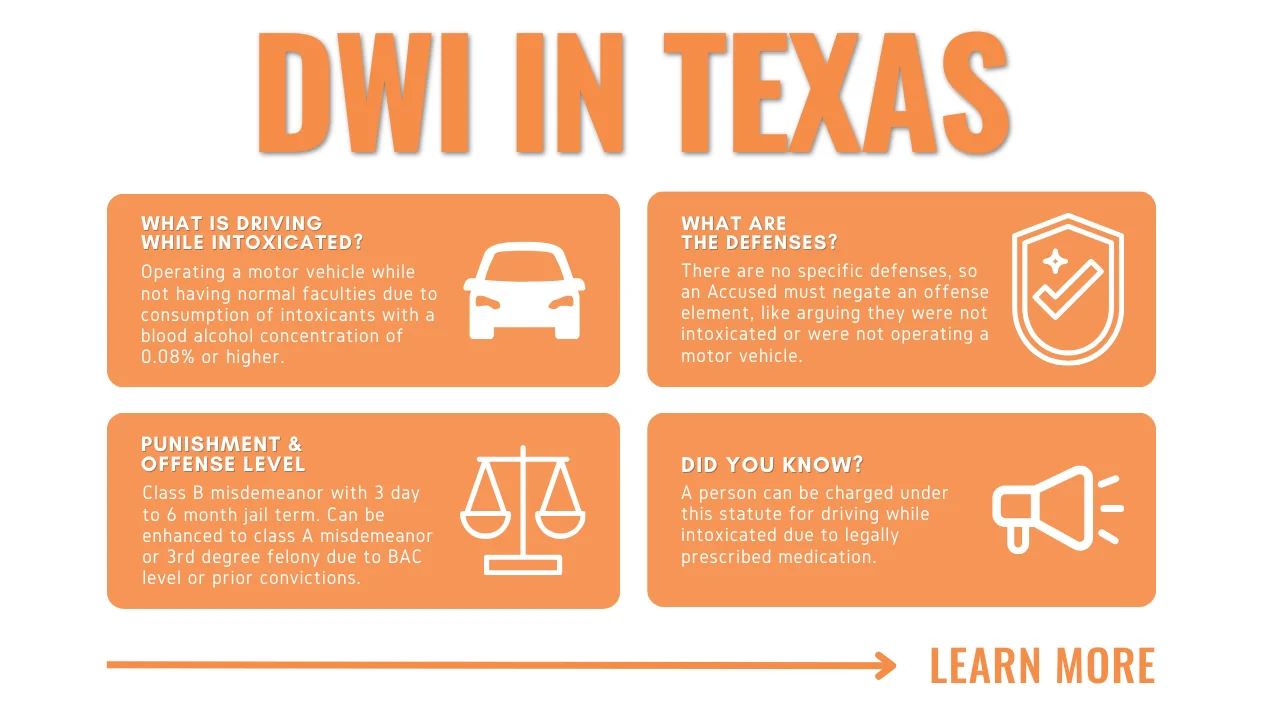
A DWI in Texas can cost thousands of dollars, including fines, court fees, and other expenses. The total cost can vary depending on the circumstances of the offense, but can range from $5,000 to $24,000. Important factors to consider:
Fines
- The fine for a DWI in Texas first offense can be upwards of $2,000.
- A second DWI offense can result in a fine upwards of $4,000.
- A third DWI offense can result in a fine of up to $10,000.
- Aggravating factors, like having a child passenger, can increase the fine.
Court fees
- Court fees include administrative fees, probation fees, and costs for required programs or classes.
- Court costs can add several hundred dollars to the total cost.
Other expenses
- Bail
- Attorney fees
- Alcohol education classes
- Increased car insurance
- Car impound and towing fees
- Car storage fees
- Ignition interlock device
- Driver’s License suspension
- License reinstatement fees
A DWI can also have long-term financial implications, such as lost income from jail time and the cost of alternative transportation. An experienced DWI attorney, like the proven Texas DUI Lawyers at Trey Porter Law, can offer more information about current expenses and use winning strategies to reduce overall Texas DWI costs.
THE DWI COST IN TEXAS
Being charged with DWI is expensive. Being convicted can be financially devastating. It’s impossible to put a price on what it’s worth to avoid incarceration, and the potential of a permanent criminal conviction.
- How Much Does a DWI Cost? The maximum fine for a first or second DWI offense in Texas is $6,000.00. The maximum fine for a Felony DWI is $10,000.00.An effective DWI lawyer can fight for dismissal and work to mitigate consequences, saving time and money, potentially preserving your career and reputation.
- How Much can you Expect to Pay for DUI? DUI is a Class C Misdemeanor in Texas, only applicable to minor drivers under the age of 21. Texas has a Zero Tolerance policy for minor drivers suspected of having any alcohol in their system. The maximum fine is $500.00.
CAN A DWI BE DISMISSED IN TEXAS?
Yes. DWI charges are dismissed every day in courtrooms across Texas. However, DWI dismissals are fought for, not given. The total cost of a DWI in Texas is easily over $10,000.00, and that’s without a final conviction. For your financial future, it’s important to avoid a DWI conviction at all costs.
- Do I Need a Lawyer for a DWI in Texas? Yes. Everyone charged with DWI or DUI in Texas needs to hire an attorney. The consequences of a criminal conviction are permanent. It’s crucial to do every single thing possible to avoid a final conviction. The first step in developing a powerful defense is hiring an experienced attorney to advocate for your rights.
- How Much Does a DWI Lawyer Cost? Thousands of dollars. The cost of DWI representation varies widely. While most attorneys bill at a fixed hourly rate, criminal defense matters like DWI and DUI are typically priced at a flat fee.
- The Cost of a Top DWI Lawyer? Nothing is more expensive than a bad lawyer. Experience matters. The best tax attorney in the world likely knows very little about defending against a DWI charge. The “experience” provided is also important. Communication leads to confidence and better outcomes. Make sure your DWI attorney is up to the task.
DWI COSTS IN TEXAS
In addition to the cost of legal representation for a DWI charge, there are a number of one-time and recurring charges built into the DWI process in Texas. They can add up quickly.
- Towed Vehicle Costs Most vehicles are towed in a DWI case. Typically, the rate to get a car out of impound is in the range of $300.00. There can be additional fees per day. Depending on the time between arrest and release, this can become costly very quickly.
- Cost of Bond and Jail Release in DWI Cases Everyone arrested in Texas is legally eligible for bond. Bail can be posted towards the bond amount, allowing a defendant to be released from jail, rather than incarcerated until the case ends. Bond amounts for DWI vary.
- How Much Does Ignition Interlock Cost? Most DWI defendants are released on bond. However, bonds come with costly conditions of release. For DWI charges, the ignition interlock device (IID) is by far the most common. IID’s are required conditions of bond for all repeat DWI offenders in Texas. These devices must be installed in all vehicles driven by the defendant, and cost approximately $100.00 per month to maintain.
- Drug Testing in Texas DWI Cases Magistrate judges often impose drug testing as a condition of bond for repeat DWI offenders. Personal Recognizance (PR) bonds typically require drug testing as well. Finally, if your DWI case results in Community Supervision, even with Deferred Adjudication, you will be required to submit to, and pay for, drug tests. The cost of testing and analysis range from $10.00 – $25.00.
COST OF DWI LICENSE SUSPENSION IN TEXAS
Almost all DWI defendants will face a license suspension due to either refusing to submit a breath or blood specimen, or because the provided specimen was above the legal limit. Texas drivers may apply for an Occupational License to drive legally during the term of suspension.
- How Much Does ALR Hearing Cost? The Administrative License Revocation (ALR) hearing is the first line of defense in every DWI case. It’s also the sole opportunity to prevent a Texas Driver License suspension. It’s important to determine whether this cost is built into the legal representation fees, or if there is additional cost for this process.
- What Does an Occupational License Cost? The Occupational License process can be quite expensive. In addition to the filing fees, and legal fees associated with the hearing on the application, there are also insurance and Texas Department of Public Safety (DPS) reinstatement fees. Occupational Licenses can easily cost over $1,000.00.
HOW MUCH ARE COURT COSTS FOR DWI IN TEXAS?
The cost of court is separate from any fines associated with a DWI case. Typically, Court Costs in a DWI case range from $200.00 – $500.00. There are no Court Costs if the DWI charge is dismissed. This is another place where an experienced DWI lawyer can mitigate expenses.
- How Much Does a First-Time DUI Cost in Texas? DUI is a Class C Misdemeanor, only applicable to Texas drivers under 21 years old. The maximum fine is capped at $500.00, and typically there is no cost of court, unless a defendant elects trial by jury and is found guilty.Those wondering how much does a DUI cost should factor that a final conviction can create life-long employment difficulties for Texas youth. This is why it is critical to do everything possible to avoid a Texas DUI conviction.
- What is the surcharge for a DWI in Texas? The Driver Responsibility Program (DRP) surcharges for a DWI in Texas were repealed on September 1, 2019, according to the Texas Department of Public Safety. This program was replaced by a new civil fee, commonly called the DWI super fine.The civil fee for a DWI in Texas is $3,000 for a first offense, $4,500 for a second offense, and $6,000 for a DWI with a Blood Alcohol Content (BAC) of 0.15 or higher. This DWI Texas civil fee is in addition to any criminal fines.
HOW MUCH DOES DWI PROBATION COST IN TEXAS?
Community supervision, or probation, as it is most commonly called, can be a good result in certain DWI cases. Particularly with Deferred Adjudication, probation can offer a pathway to dismissal. All counties in Texas charge a monthly supervisory fee to participate in probation. These fees can vary widely, but often fall between $50.00 – $100.00.
- What Does DWI Education and Victim Impact Cost? Classes, like DWI Education and the Victim Impact Panel are standard requirements of all intoxication probation conditions in Texas. These classes cost hundreds of dollars, and require time away from work to complete.
- How Much Does DWI Probation Violation Cost? DWI probation violations are costly. A probation violation results in the State filing a Motion to Revoke Probation, which triggers the issuance of an arrest warrant from the judge.
DWI Costs: Protect Your Future with Trey Porter Law
A Texas DWI can cost more than just money – it can jeopardize your career, reputation, and freedom. From fines and court fees to skyrocketing insurance rates and license suspensions, the financial impact is overwhelming. The best way to control these costs? Avoiding a conviction. The award-winning DWI defense team at Trey Porter Law has a proven track record of getting cases dismissed and charges reduced. Don’t risk your future – schedule a free consultation today and put experience on your side.















